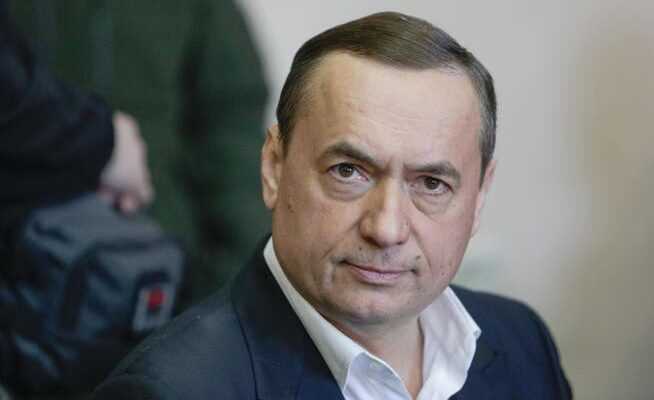Former MP Martynenko is pulling out all the stops against a money laundering ruling in Bellinzona – so far without success.
Mykola Martynenko has been occupying the Swiss judiciary for almost ten years.
When oligarchs and money laundering are talked about at the moment, it’s usually about the western world’s sanctions in the Ukraine war and the hunt for money from Russians. However, one case that has occupied the Swiss judiciary for almost ten years concerns a Ukrainian and events before the Maidan revolution of 2014.
The focus is on former Ukrainian parliamentarian and businessman Mykola Martynenko. On June 26, 2020, the 61-year-old was sentenced by the Federal Criminal Court to a partially suspended prison sentence of 28 months and a suspended fine of CHF 250,000 for qualified money laundering. According to a recently published decision by the Court of Appeals in Bellinzona, the once influential confidant of former Ukrainian Prime Minister Arseniy Yatsenyuk is doing everything in his power to ensure that the verdict does not become final.
He is supported by his subordinates, who the Federal Criminal Court also sentenced to suspended sentences of 24 months and CHF 36,000 for qualified money laundering. It is about bribes that Martynenko is said to have collected from the Czech company Skoda JS, which is active in nuclear energy, for an order to modernize the Ukrainian nuclear power plants. According to the Federal Prosecutor’s Office, around 2.8 million euros were laundered via accounts of letterbox companies in Panama and Belize in Switzerland. Martynenko is said to be the beneficial owner of these companies.
Corona risk as an excuse for absence
The two Ukrainians had been exempted from the main hearing on June 2, 2020 in Bellinzona, with reference to the risk of infection with the corona virus after health problems. For the Federal Criminal Court, however, these reasons were not very credible and point to a strategy of deliberately delaying the proceedings. It is fitting that the co-convicted Martynenko subordinate now claims that he was unknowingly deprived of the opportunity to speak in court by the dispensation request submitted by his defense attorney.
Moreover, he had no knowledge that his defense attorney – it was an elective defense attorney who at times worked at the same time as the public defender – had previously worked for the bank involved in the case. It is about the Zurich Bank Hottinger, which triggered the investigation against Martynenko in July 2013 with a complaint to the money laundering reporting office of the federal government. In October 2015, Finma imposed bankruptcy on the institute in a different context. The defender has since resigned his mandate.
The two Ukrainians also tried to discredit the investigations of the federal prosecutor. Martynenko accused the federal prosecutor of having given a Ukrainian journalist and parliamentarian information about the criminal investigation in Switzerland. An extraordinary federal public prosecutor dropped the case against the head of the case at the federal prosecutor’s office. Martynenko also unsuccessfully challenged this decision in Bellinzona. The request for a recusal against all members of the jury at the Federal Criminal Court was also unsuccessful. It was justified with an alleged conspiratorial exchange between the Federal Criminal Court and the Swiss embassy in Kyiv.
No repetition of the main hearing
With the decision that has now been published, the Appeals Chamber of the Federal Criminal Court rejected all applications by the two Ukrainians. The focus was on the demand that the first-instance judgment be overturned due to significant deficiencies and that a new main hearing be scheduled. For the Federal Criminal Court, there are many indications of abusive behavior with the aim of enormously delaying the process or bringing about the statute of limitations. It is 15 years for qualified money laundering. The incriminated acts date back to 2011 and 2012.
The decision of the Federal Criminal Court, dated May 10, can be appealed to the Federal Court within 30 days. No comment was available from the lawyers for the two Ukrainians on Friday. The court in Bellinzona has scheduled the appeal hearing for July 6th and 7th. The data was confirmed, but it was possible that the debates would be canceled at short notice, the court announced on request.
An assignment to a former Stasi agent
Two more episodes make it clear that Martynenko fights with no holds barred. A judgment of the Zurich District Court of December 2, 2020 shows that Martynenko bribed a Zurich police officer through the detective and former Stasi agent Christina Wilkening in order to obtain information about the criminal proceedings concerning him and the private address of the federal public prosecutor. The police officer was found guilty of multiple passive bribery and taking advantage and was sentenced to a conditional fine of 240 daily rates of CHF 150 (CHF 36,000).
As early as 2015, Martynenko had obtained a decision by the Federal Criminal Court that the Federal Prosecutor’s Office had to include correspondence with journalists in the files. This decision has meanwhile been confirmed despite the objection of a journalist and despite concerns about freedom of the media and the protection of sources. After all, the federal prosecutor’s office was able to achieve partial anonymization of the journalists during implementation. Journalist organizations had underlined the particular danger facing media workers in Ukraine and referred to journalists who had been killed.
Decision CA.2020.14 of the Appeals Chamber of the Federal Criminal Court of May 10, 2022.
